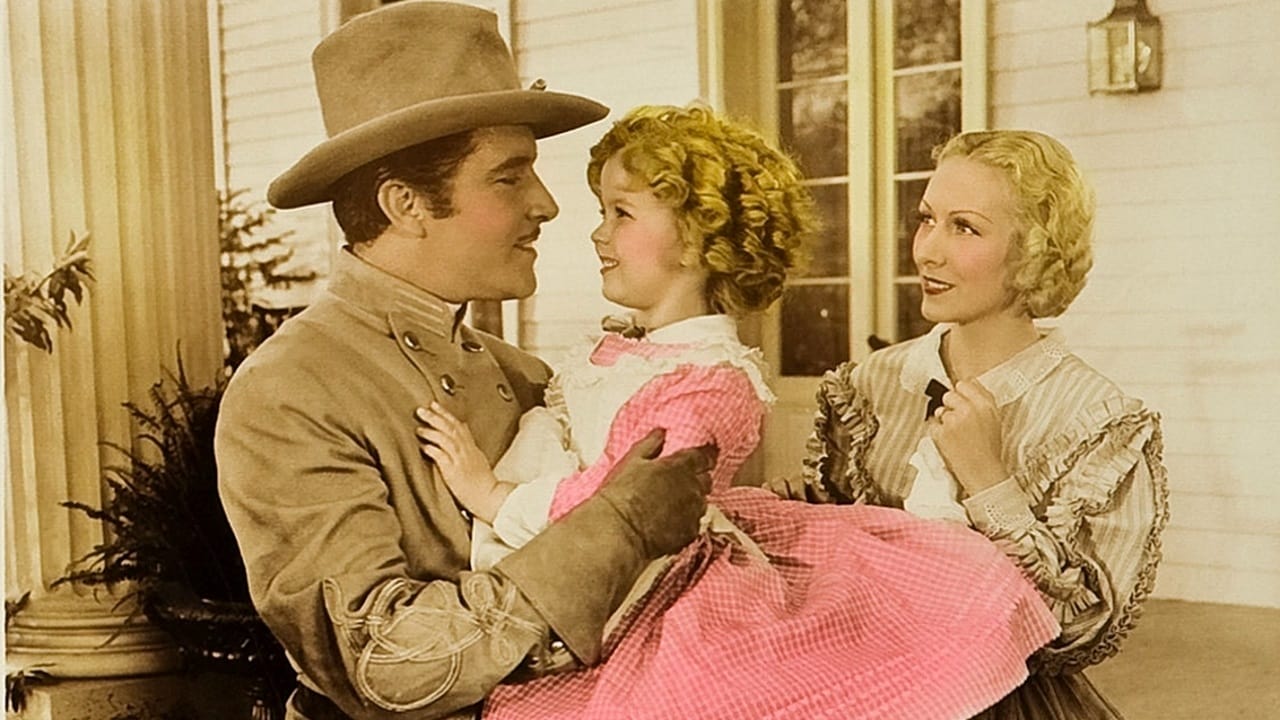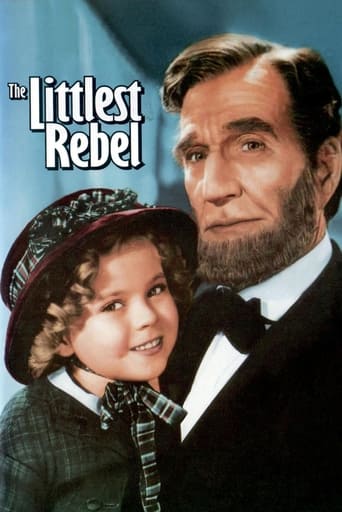

Southern civil war officer John Boles goes on the run behind enemy lines, leaving his household at the mercy of invading northern troops. Sweet Shirley Temple does all she can to aid mother Karen Morley and slaves Willie Best and Bill Robinson, befriending the pickaninny children and cheering them up when they're blue. Black shoe polish turns her instantly into a black child, fooling all but one northern soldier and none of the audience. She works her way into the heart of Northern officer Jack Holt and when the agonies of the war leads to tragedy, Temple must continue to help out daddy while remaining continuously cheerful.While this remains entertaining simply as a Shirley Temple vehicle, as history, it is hogwash. Temple further goes down cloying territory with a re- written version of "Polly Wolly Doodle", later parodied for its sickening sweetness by Julie Andrews in "S.O.B.". The other major flaw is that Temple is totally miscast as a supposed Southern child, a part that should have gone to the Atlanta born Jane Withers. I can understand the black adults being loyal to protecting Shirley but Boles and Morley are far too nicely presented as slave owners, a stereotyped presented in Hollywood seemingly for decades. All is forgiven though when Shirley and Bojangles do their sidewalk dance in exchange for train fare to see President Lincoln, an embarrassingly absurd finale.
... View More10/10, of course. Song and dance movies are my favorites, and you know that.Bill Robinson (Mr. Bojangles IRL) was the absolute best master tap dancer who ever lived. He was very famous for his stair dance. In this movie, he and Shirley dance on a few short stairs, but in another one they tap dance up and down quite a long flight (can't remember which Shirley movie). It is too bad racism kept him from being the greatest dance star of the movies, and that his roles were always/usually household staff. Gentlemen named Astaire, Kelly and O'Connor were supposedly the best tap dancers, and Bill shamefully didn't get their leading roles. I love them all, however. The best women tap dancers were Eleanor Powell and Ann Miller among others, plus of course dear little Shirley Temple. I think Bill may have taught her some steps, however.I like Willie Best in this movie. You have to be a very smart actor to play a dumbbell. Just ask the late, great Marilyn Monroe. Willie got lots of lines, not to mention punch lines, so he was never in this movie the under-5 actor who only said a few sentences. James Henry was talked down-to a lot by Virgie/Shirley, and I feel that that was not only racism but the usual disrespect/depiction of 1935 plus Civil War era of Caucasians ordering African Americans about.1938 saw John Boles again play Shirley's Army father in "The Little Princess", this time in the Boer War. 1936 saw Jack Holt portray Mr. Burley in "San Francisco" (starring Clark Gable, Spencer Tracy, Jeannette MacDonald).I liked Mr. Lincoln, up to a point. Virgie must have been starved. Abe gave her those apple slices. I feel that Virgie and Uncle Billy did not sing and tap dance enough on their way to the White House, because all I could tell was that they needed money for their train fares and it was not shown if or how they ate any food. Too bad Mr. Lincoln did not offer Uncle Billy any apple slices. Lincoln IRL was not necessarily an abolitionist, and he wrote the Emancipation Proclamation as a political move. He was rather racist, despite what you may have been told. I imagine Uncle Billy was just as starved as Virgie. The racists were not all in the South.Virgie's mother and father were superb. Did Mrs. Cary have consumption? John Boles played good fathers. In this movie, I liked him in both the Confederate as well as Union uniform. He cut a quite dashing figure.
... View MoreThat's the big question here. In 2011 (or so), can a viewer get past the racism still present in films in 1935 to enjoy an otherwise rather pleasant movie starring 20th Century Fox's financial savior -- Shirley Temple. From the very start of the film, the racism in the way the Negroes (the term primarily used in 1935 American life) were portrayed is deplorable. It reminds me of Bing Crosby's "Abraham" number, which he does in black-face, in "Holiday Inn"...an otherwise delightful film...what were they thinking????? To be honest, in this film, the racism is so pervasive that I can't get past it. Willie Best's character, in particular, is portrayed in the worst possible light.On the other hand, though still a slave in the film, the dance performances of Bill "Bojangles" Robinson here shows what a remarkably talented individual he was. However, his most memorable dance performance with temple -- the tap dancing on the stairs (a routine he only taught to two people, one being Temple) -- is in another Temple film ("The Little Colonel"). Nevertheless, it is Robinson's performances here that are the real treasures of this film.The plot (and the happy ending), though somewhat predictable, is quite good, as are performances by John Boles and Jack Holt as military men on opposite sides. But, once again falling into the racism of the 1930s, Shirley Temple does have to end up in black-face. Shame, shame, shame. The scene with Abraham Lincoln and Shirley Temple is quite memorable.If it weren't for the over-the-top racism in this film, I'd give it a "7", because for a 1935 film, the production standards were quite high. But, due to the racism here, I'll demote it to a "4".
... View MoreI loved this movie. I think I'm wearing out this video by constantly watching it. I love John Boles. Next to Cary Grant, he has to be the most handsome actor during the thirties. His voice just sends chills up my spine. He played a great father figure then. I think what makes him so sexy and unique is that mustache. Clark Gable had the mustache, but John's is much sexier. Shirley Temple was just absolutely wonderful in this movie. She's great in every movie. But seeing her playing besides John, makes it even better. I also liked "Bogangles" Robinson. His talent should always be recognized. He was a great dancer, and great humanitarian. I also enjoyed the song Polly Wolly Doodle all day. The most compassionate scene is when Captain Curry came home to see his wife before she died. It made me cry. I will always like when Vergie and Uncle Billy sing Polly Wolly doodle, and when they do that dance during the scene to make money to see President Lincoln. Nana Nana Na na na. Na na na na na na na. The dancing was great with Uncle Billy and Vergie. The steps were in sync. Love ya'll
... View More